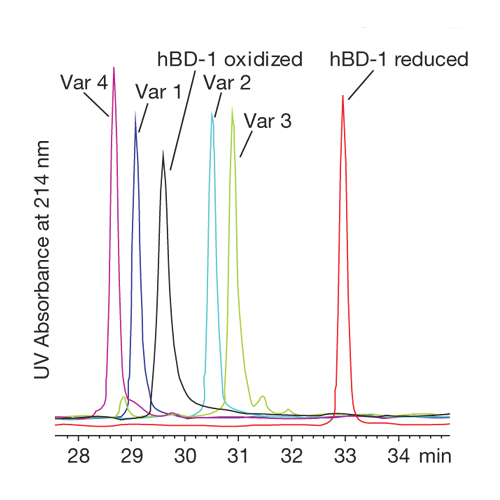Reduction of disulphide bonds unmasks potent antimicrobial activity of human Beta-defensin 1
19-Jan-2011
Nature, 2011, doi:10.1038/nature09674, Nature Volume: 469, Pages: 419–423 published on 19.01.2011
Nature, online article
Nature, online article
Human epithelia are permanently challenged by bacteria and fungi, including commensal and pathogenic microbiota. In the gut, the fraction of strict anaerobes increases from proximal to distal, reaching 99% of bacterial species in the colon. At colonic mucosa, oxygen partial pressure is below 25% of airborne oxygen content, moreover microbial metabolism causes reduction to a low redox potential of 2200mV to –300mV in the colon. Defensins, characterized by three intramolecular disulphide-bridges, are key effector molecules of innate immunity that protect the host from infectious microbes and shape the composition of microbiota at mucosal surfaces. Human Beta-defensin 1 (hBD-1) is one of the most prominent peptides of its class but despite ubiquitous expression by all human epithelia, comparison with other defensins suggested only minor antibiotic killing activity. Whereas much is known about the activity of antimicrobial peptides in aerobic environments, data about reducing environments are limited. Herein we show that after reduction of disulphide-bridges hBD-1 becomes a potent antimicrobial peptide against the opportunistic pathogenic fungus Candida albicans and against anaerobic, Grampositive commensals of Bifidobacterium and Lactobacillus species. Reduced hBD-1 differs structurally from oxidized hBD-1 and free cysteines in the carboxy terminus seem important for the bactericidal effect. In vitro, the thioredoxin (TRX) system is able to reduce hBD-1 and TRX co-localizes with reduced hBD-1 in human epithelia. Hence our study indicates that reduced hBD-1 shields the healthy epithelium against colonisation by commensal bacteria and opportunistic fungi. Accordingly, an intimate interplay between redox-regulation and innate immune defence seems crucial for an effective barrier protecting human epithelia.











